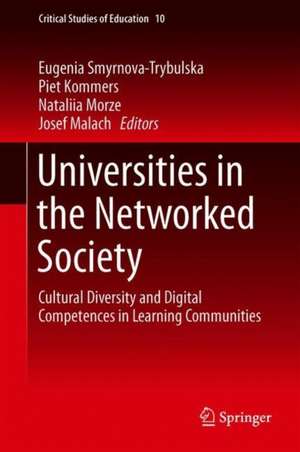Universities in the Networked Society: Cultural Diversity and Digital Competences in Learning Communities: Critical Studies of Education, cartea 10
Editat de Eugenia Smyrnova-Trybulska, Piet Kommers, Nataliia Morze, Josef Malachen Limba Engleză Hardback – 29 mai 2019
Din seria Critical Studies of Education
- 24%
 Preț: 575.45 lei
Preț: 575.45 lei - 15%
 Preț: 642.03 lei
Preț: 642.03 lei -
 Preț: 392.37 lei
Preț: 392.37 lei - 18%
 Preț: 998.51 lei
Preț: 998.51 lei - 18%
 Preț: 1002.31 lei
Preț: 1002.31 lei - 18%
 Preț: 892.74 lei
Preț: 892.74 lei - 15%
 Preț: 635.15 lei
Preț: 635.15 lei - 18%
 Preț: 723.24 lei
Preț: 723.24 lei - 18%
 Preț: 778.45 lei
Preț: 778.45 lei - 15%
 Preț: 639.90 lei
Preț: 639.90 lei - 15%
 Preț: 643.84 lei
Preț: 643.84 lei - 18%
 Preț: 730.47 lei
Preț: 730.47 lei -
 Preț: 389.49 lei
Preț: 389.49 lei -
 Preț: 389.11 lei
Preț: 389.11 lei -
 Preț: 390.63 lei
Preț: 390.63 lei - 18%
 Preț: 727.66 lei
Preț: 727.66 lei
Preț: 787.91 lei
Preț vechi: 960.87 lei
-18% Nou
Puncte Express: 1182
Preț estimativ în valută:
150.78€ • 163.73$ • 126.66£
150.78€ • 163.73$ • 126.66£
Carte tipărită la comandă
Livrare economică 23 aprilie-07 mai
Preluare comenzi: 021 569.72.76
Specificații
ISBN-13: 9783030050252
ISBN-10: 3030050254
Pagini: 332
Ilustrații: X, 301 p. 118 illus.
Dimensiuni: 155 x 235 x 20 mm
Greutate: 0.61 kg
Ediția:1st ed. 2019
Editura: Springer International Publishing
Colecția Springer
Seria Critical Studies of Education
Locul publicării:Cham, Switzerland
ISBN-10: 3030050254
Pagini: 332
Ilustrații: X, 301 p. 118 illus.
Dimensiuni: 155 x 235 x 20 mm
Greutate: 0.61 kg
Ediția:1st ed. 2019
Editura: Springer International Publishing
Colecția Springer
Seria Critical Studies of Education
Locul publicării:Cham, Switzerland
Cuprins
Editorial / Introduction.- Chapter 1: Innovative MA Programme “E-learning in Cultural Diversity”; Eugenia Smyrnova-Trubulska, Nataliia Morze.- Chapter 2: Digital competencies of university teachers; Nataliia Morze, Oksana Buinytska.- Chapter 3: Professional training: challenges in the digital economy context; Tatiana Noskova, Tatiana Pavlova, Olga Yakovleva.- Chapter 4: Formation of Computing and Coding Competences of Computer Sci-ence Teachers in Ukraine; Nataliia Morze, Maria Umryk.- Chapter 5: Networking Through Scholarly Communication: Case IRNet Project; Eugenia Smyrnova-Trubulska, Nataliia Morze, Olena Kuzminska.- Chapter 6: Report Writing Assessment for Postgraduate Students: Lecturer’s Perspective; Tomayess Issa, Theodora Issa.- Chapter 7: Develop and Implement MOOCs Unit: a Pedagogical Instruction for Academics, Case Study; Eugenia Smyrnova-Trubulska, Elspeth McKay, Nataliia Morze, Olga Ya-kovleva, Tomayess Issa, Theodora Issa.- Chapter 8: Synchronous Virtual Classrooms in Problem-Based Learning to Men-tor and Monitor Students in Higher Education; Juan Arias-Masa, Rafael Martín-Espada, Rocío Yuste-Tosina, Prudencia Gutiérrez-Esteban, Gemma Delicado-Puerto, Sixto Cubo-Delgado, Laura Alonso-Díaz.- Chapter 9: Multi-level Study of the Higher Education Challenges Caused by the Migration Crisis in Turkey; Iryna Sekret, Darco, Jansen, Bülent Doş.- Chapter 10: From Face-to-Face Teaching to Online Tutoring: Challenges, Solu-tions, Perspectives; Iryna Sekret, Soner Durmuş, Melih Gürer, Orhan Çuraoğlu.- Chapter 11: E-learning Competencies for University and College Staff; Magdalena Roszak, Iwona Mokwa-Tarnowska and Barbara Kołodziejczak.- Chapter 12: Approaches to the development of the ICT-competence standard in the system of research-based training for the future specialist of social sphere in Ukraine; Roman O. Pavliuk, Tetiana L. Liakh.- Chapter 13: Modernization of Environmental Education with the Use of Project-Based Learning, Outdoor Education and Mobile Learning Supported by Information and Communication Technology; Imrich Jakab, Martina Zigová, Zuzana Pucherova.- Chapter 14: Collaborative Learning as Learning Based on Cooperation with the Use of New Technologies; Jolanta Szulc.- Chapter 15: Possible Cultural Diversity and Digital Competences – Retrospection from Mathematical Textbooks for Lower Secondary Level; Ján Gunčaga, Matthias Brandl, Péter Körtesi.- Chapter 16: Reinforcement of Logical and Mathematical Competences Using a Didactic Aid Based on the Theory of Constructivism; Tomasz Kopczyński, Anna Gałuszka.
Textul de pe ultima copertă
This book presents research on the effects and effectiveness of ICT applications in lifelong learning in relation to digital competences of educators. It sketches recent and future evolutions in higher education, explores whether universities have adjusted policies and business models in line with the rapid development of ICT technologies, and analyses whether the adjustments made are merely cosmetic or truly future-proof. The book specifically deals with such topics as digital competencies of teaching staff, the development and implementation of MOOCs and other E-learning tools, virtual classrooms, online tutoring, and collaborative learning. It presents case studies of innovative master’s programmes, projects and methods, and processes of standardization and validation used in various countries as illustrations. The book explains the rapid transition of the knowledge society to the "society of global competence" and shows the necessity of an active implementation of innovative formsand effective methods of education, and above all, distance learning at all levels of education.
Caracteristici
Contains important research results from the European Union Project IRNet Advances the discourse on how to adjust to the larger trends in Higher Education Shows the need for the systematic use of LMS systems, MOOCs, virtual classroom technology, social media, and Web 2.0 and Web 3.0 technology
